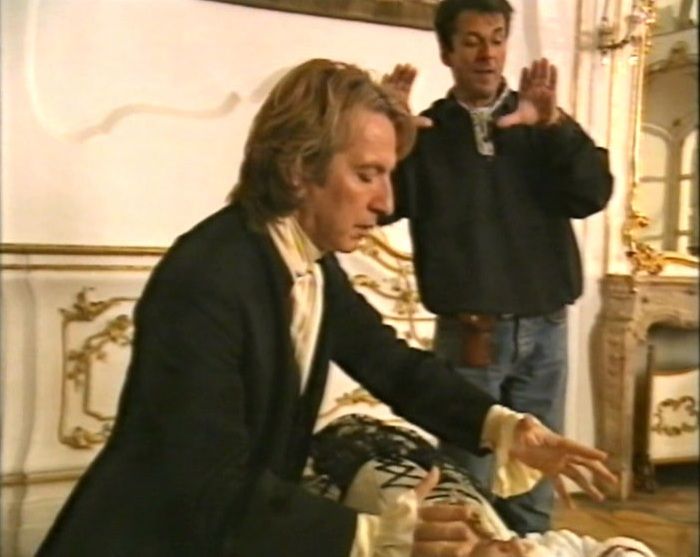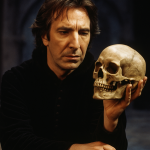March 12, 1994
By Graham Wood – The Times Magazine
“IS IT ANY FUN talking to actors?” Alan Rickman asks. “I’d have thought it would be a nightmare.” He clearly believes that talking to journalists is worse. Few have been allowed the privilege and those who are let in have received lists of taboo subjects concerning his domestic and romantic life.
“The reason I don’t like talking to most journalists is their desire to reduce everything to a one-page article and to make you compare things.” Rickman says. “You find yourself forced to answer the question, when really what you want to say is: ‘Nothing is like anything else and I’m not thinking of anything else I’ve done, just the job in hand.’ So a slight prison is created.”
It is not only journalists who find Rickman something of a challenge. After three days of non-stop luvviness on the set of his latest film, Mesmer, with the cast chorusing, “He’s so generous, so kind, such a unique presence“, someone finally admitted that this was not the whole story. “He’s famously tricky to work with,” says the actor Simon McBurney.
“When he’s preparing on the set there isn’t much communication,” he explains. “Everyone does something different to get the juices flowing and with Alan it’s to find fault: ‘This isn’t right, that’s no good.’ He’s aloof on the set, which has led to friction with the director. But then you need that kind of thing in the creative process.”
“He can seem difficult”, says Stephen Poliakoff, who directed Rickman in Close My Eyes, “but I’ve known many more troublesome. He is concerned about the way he looks, like American actors, but without their competitive nature. Although he steals scenes, I don’t think he sets out to.”
Roger Spottiswoode, the director of Mesmer, to be released here in the autumn, agrees that Rickman is “not the easiest person to persuade to try out new ideas; he’ll test you before he accepts them.” For instance, Spottiswoode wanted the character of Mesmer, a tortured visionary who understood alternative therapy 200 years in advance, to be more emotionally involved with the character of a young blind girl he attempts to cure. One of his ideas was for Rickman to lick the girl’s eyelids, but the actor objected, perhaps because he felt it crossed some undefined ethical divide between dramatic necessity and gratuitous lechery. “There are always discussions about whether an actor is arguing for the character or projecting himself on to it”, Spottiswoode says, “but Rickman will take real chances with his character being hard to like. He became the character during filming, so when there were arguments it was as though he was talking as Mesmer: brilliant and Jesuitical, charming and full of hubris.”
IN THE END, Rickman got his way. His ability to contribute to the process of character development is part of his perceived worth as an actor: he has an elaborately conceived notion of what is psychologically feasible and convincing for his character to do. It is a wider perspective, say his supporters, than most other actors would offer, encompassing freakish outbursts, passion and sullenness in preference to any straightforward interpretation.
“I need time to go home and find out who I am,” he said at one point, suggesting the depth of his immersion in the role. “Confusion over your identity is common to every actor,” says the writer and director Anthony Minghella. “You pretend to be someone else, and so your homework is to slough off your part and put on your own skin.”
If there is more than one Alan Rickman, there are also different facets to his talent. He was propelled into movies following his stage performance as Valmont in Les Liaisons Dangereuses, for which he won a Tony award in America*. Although he was passed over for Stephen Frears’s version of the play, Rickman was rewarded with the role of Hans Gruber in Die Hard. In this film, the RADA-trained actor found himself playing the villain in a farcically violent and melodramatic Bruce Willis vehicle.
The menace he had worked up in years of stage performance, from the fringe to the RSC, transmitted itself with equal force on screen. He went on to play the Sheriff of Nottingham in Robin Hood: Prince of Thieves, eclipsing the putative star, Kevin Costner, with a combination of outrageous camp and vicious anger. In this role he won a Bafta award for best supporting actor.
But outside mainstream Hollywood films, there has been a very different, more complex body of work: the lover who returned from the dead to console the grieving Juliet Stevenson in Minghella’s Truly Madly Deeply, the husband cuckolded buy his wife’s affair with her brother in Close My Eyes and a political fixer in Tim Robbins’s satire Bob Roberts.
So far, despite lavish praise for his film appearances, he has never taken the lead role. There has always been a central character – Willis in Die Hard, Stevenson in Truly Madly Deeply, Costner in Robin Hood and Saskia Reeves in Close My Eyes – against whom he can play off his peculiar brand of demonic or self-absorbed brio. “He had a long wait to become a leading actor”, Poliakoff says, “which doesn’t reflect well on British directors.”
Rickman’s strongest suit in Hollywood remains the pantomime villain given a chillingly believable streak of charm. But for the British theatre-goer, the genuine article, in the flesh, has become an eagerly anticipated event. Tango at the End of Winter in 1991 captivated audiences with Rickman’s quiet, logically argued madness. His Hamlet, at London’s Riverside Theatre in 1992, was dangerous, unlikable and sold out its run. He was, said the critics, mesmeric.
Franz Anton Mesmer was celebrated in 18th-century Vienna as a miracle healer, treating seemingly incurable cases with physical touch, hypnotism, electric currents and magnetism. The medical establishment was scandalised and Mesmer was eventually exiled to France, where he became a darling of the aristocracy.
Since Rickman’s opinion of most scripts offered him is that they are “like junk food, things to keep the cinema full”, he was keen to do something of substance. A screen play by Dennis Potter added eroticism and mystery to an already cracking tale, and the producers Lance Reynolds and Wieland Shultz-Keil had drawn together a $9.5-millio budget from Canadian, British and European sources, partly on the strength of Rickman’s commitment to the project.
SO THE MITTEL-EUROPEAN winter found him in a vast Hungarian palace, shooting a scene in which a young Viennese woman collapses at the piano and Mesmer – ignoring protestations from the watching nobility – tends to her by rubbing her breasts as she lies on top of the instrument.
“What’s interesting about the process of acting”, he says afterwards, “is how often you don’t know what you’re doing. The acting touches nerves you have absolutely no control over.” He still finds it traumatic getting up on stage, a telling admission from an actor who seems to radiate poise. “I get stage fright and gremlins in my head saying: ‘You’re going to forget your lines.’”
Poliakoff puts it down to Rickman being “a worrier, in a good sense. He’s not afraid to go against the grain, and he puts an enormous amount of thought into everything he does.”
Purists might mock the idea of such intensity being applied to some of the Hollywood pap Rickman has wound up in. But then most purists earn more than the £150 a week that provincial theatre provides. He has clearly been choosing parts which will help him to build a reputation for villainy and comic timing to add to his stage plaudits. Besides, he compares the restfulness of film-making after the theatre with “a glass of ice-cold water when you have been in the desert”.
Mesmer appealed to Rickman because the character is about “bravado and reckless cliff-diving, not the story of someone in complete control. If the part had been badly written it would have been like whoring. ‘Could you please turn on the tap.’ Some things I’m offered in the States, I can’t actually see why anyone’s bothering except for the pay cheque. You read the script and think: ‘Why?‘ It’s a law of diminishing returns, because if I don’t believe in it, then I won’t be any good. You come to see yourself as a chemical component to be injected into something.”
The veracity of Mesmer’s character, he says, “is for anyone to decide, but I think it will come out sympathetically”. Then he laughs, “A camera angle can change all that. You can think, ‘This is my moment of utter emotional honesty’, and then the camera goes another foot lower down and shoots up your nostrils and that’s emotional honesty out the window. Suddenly you’re being incredibly devious.”
The film itself is something of a risk, aiming boldly at an audience sophisticated enough to appreciate 18th-century mores and to follow the thread leading from Mesmer to modern psychoanalysis and the holistic approach of alternative medicine. It is certainly a serious piece of work, viewed as such by Rickman. He attended a hypnotist’s show as research and has introduced some of that theatricality into the part.
“It’s important that the performance comes from inside”, McBurney says, “and Alan’s perfect for that. He doesn’t project at all, which is curious for an actor who projects so much on the stage. He just lets the camera come and find it.”
What most female cinema-goers have found is sex. Poliakoff grows lyrical in this praise of Rickman’s allure: “A lot of women find him very sexually attractive. He has a depth, along with dangerous, mercurial sexuality, and there aren’t many actors like that. He’s idiosyncratic, but also very sexy. It’s an intriguing combination.”
Stevenson found herself on the receiving end of Rickman’s intrigue at the RSC. “I was quite frightened of him”, she has said, “but he was very kind and picked me up in a non-sexual way. He has a talent for collecting people and encouraging them.” The two have remained close, acting together in Les Liaisons Dangereuses before Truly Madly Deeply. “We used our own relationship in that film,” she has said. “I really am the Nina character, juggling a hundred balls in the air at the same time and driving Alan potty with my scatterbrained way of doing things. He is much more selective and sure in his taste, which can be equally infuriating. But he’s a great anchor in my life.”
Rickman’s fan mail bulges with requests for signed pictures (which he happily supplies) and other, more intimate requests. “I’m not going to talk about them”, he begins, “because it would betray the people who sent them, but I don’t answer them. It’s a weird area. There you are, 15ft across the screen, and people can visit all sorts of fantasies on your face that are nothing to do with you. You just have to deal with it. I still go down Portobello Road and buy the veg.”
One male correspondent, who has traced Rickman’s home address, sends him every negative press cutting he can find, with the message: “Just thought you should know.” Black New Yorkers loved his neo-Nazi terrorist in Die Hard. “They come up to me and say: ‘Yo! My main man!’ I don’t know what it is. They want him to get away with it, I suppose.
Rickman tries to resist the snares of stardom. “I like the phrase of David Hare’s: ‘Show business thins the mind!’ If you spend any time in Los Angeles, there’s only one topic of conversation.”
OUTSIDE THE confines of his job, he lives with his long-standing partner Rima Horton, an economics lecturer who stood as the Labour parliamentary candidate for Chelsea in the last election. They have no children. He says he has had feminism “knocked into me, and a jolly good thing, too”. He will not go further into his private life: “That sort of thing gets a bit personal. Not having had children has given me more space to work, I’m sure that’s true, and when I work I’m very driven, but otherwise I don’t sit around missing acting.”
Like his partner, Rickman is a socialist, and his sense of fairness and humanity find practical expression. “He has helped many young actors, including financially,” an old friend says. “If he has changed in any way, it’s that he has become more generous.” When he discovered that the Hungarian extras on Mesmer were being fed bread rolls while the cast and crew had cooked meals, he stormed into the producer’s office to demand they got equal treatment.
The question hanging over Mesmer is whether Rickman can for the first time carry a whole film. This month the Cannes Festival mandarin Gilles Jacob will decide whether it meets his criteria for the main competition. If he does, and it is favourably received, Alan Rickman may, at 47 – two decades after he won a scholarship to RADA and his body “sighed with relief in being in the right place” – become a headlining international star. Gillian Barge, playing his wife in Mesmer, feels sure he can pull it off: “Alan’s quite unique in the intensity of his internal life. He’s a shifting, mercurial kind of person, and very, very mesmeric.
*He was only nominated; James Earl Jones won for “Fences”



